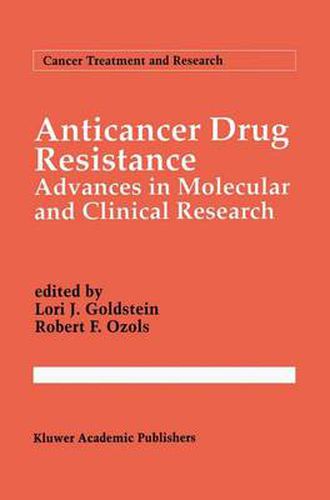Readings Newsletter
Become a Readings Member to make your shopping experience even easier.
Sign in or sign up for free!
You’re not far away from qualifying for FREE standard shipping within Australia
You’ve qualified for FREE standard shipping within Australia
The cart is loading…






This title is printed to order. This book may have been self-published. If so, we cannot guarantee the quality of the content. In the main most books will have gone through the editing process however some may not. We therefore suggest that you be aware of this before ordering this book. If in doubt check either the author or publisher’s details as we are unable to accept any returns unless they are faulty. Please contact us if you have any questions.
Over the last 50 years, drug development and clinical trials have resulted in successful complete responses in diseases such as childhood leukemia, testicular cancer and Hodgkin’s disease. We are still, however, confronted with over 500,000 cancer-related deaths per year. Clearly, the phenomenon of drug resistance is largely responsible for these failures and continues to be an area of active investigation.
Since the last volume in this series, we have learned that the energy-dependent drug efflux protein, p-glycoprotein, encoded by the MDR 1 gene, is a member of a family of structurally related transport polypeptides, thus allowing us to explore the relationship between structure and function. In addition to ongoing well designed clinical trials aimed at reversing MDR mediated drug resistance, the first gene therapy studies with the MDR 1 gene retrovirally transduced into human bone marrow cells are about to be initiated.
Although MDR is currently the most understood mechanism of drug resistance, we are uncovering increasing knowledge of alternative molecular and biochemical mechanisms of drug resistance to antimetabolites, cisplatin and alkylating agents and developing new strategies for circumventing such resistance.
It is clear that drug resistance is complex, and many mechanisms exist by which cancer cells may overcome the cytotoxicity of our known chemotherapeutic agents. As our understanding of each of these mechanisms expands, well designed models will be necessary to test laboratory hypotheses and determine their relationship to drug resistance in humans. It is this integration of basic science and clinical investigation that will both advance our scientific knowledge and result in the improvement of cancer therapy.
$9.00 standard shipping within Australia
FREE standard shipping within Australia for orders over $100.00
Express & International shipping calculated at checkout
This title is printed to order. This book may have been self-published. If so, we cannot guarantee the quality of the content. In the main most books will have gone through the editing process however some may not. We therefore suggest that you be aware of this before ordering this book. If in doubt check either the author or publisher’s details as we are unable to accept any returns unless they are faulty. Please contact us if you have any questions.
Over the last 50 years, drug development and clinical trials have resulted in successful complete responses in diseases such as childhood leukemia, testicular cancer and Hodgkin’s disease. We are still, however, confronted with over 500,000 cancer-related deaths per year. Clearly, the phenomenon of drug resistance is largely responsible for these failures and continues to be an area of active investigation.
Since the last volume in this series, we have learned that the energy-dependent drug efflux protein, p-glycoprotein, encoded by the MDR 1 gene, is a member of a family of structurally related transport polypeptides, thus allowing us to explore the relationship between structure and function. In addition to ongoing well designed clinical trials aimed at reversing MDR mediated drug resistance, the first gene therapy studies with the MDR 1 gene retrovirally transduced into human bone marrow cells are about to be initiated.
Although MDR is currently the most understood mechanism of drug resistance, we are uncovering increasing knowledge of alternative molecular and biochemical mechanisms of drug resistance to antimetabolites, cisplatin and alkylating agents and developing new strategies for circumventing such resistance.
It is clear that drug resistance is complex, and many mechanisms exist by which cancer cells may overcome the cytotoxicity of our known chemotherapeutic agents. As our understanding of each of these mechanisms expands, well designed models will be necessary to test laboratory hypotheses and determine their relationship to drug resistance in humans. It is this integration of basic science and clinical investigation that will both advance our scientific knowledge and result in the improvement of cancer therapy.